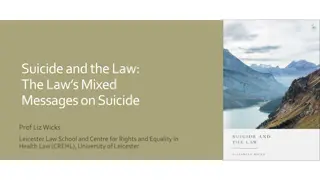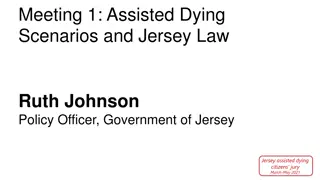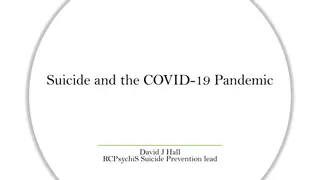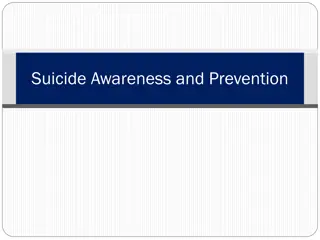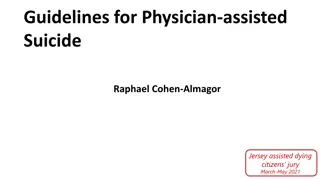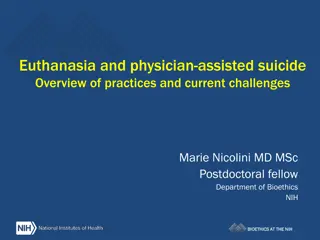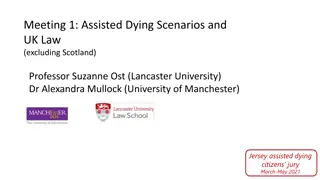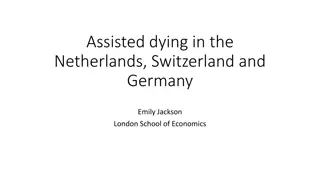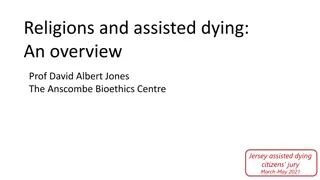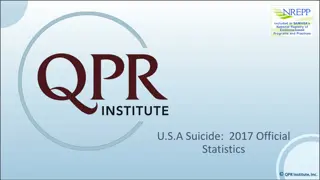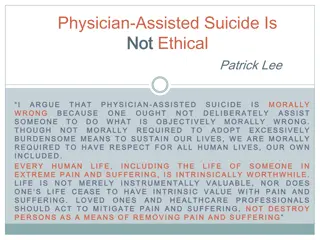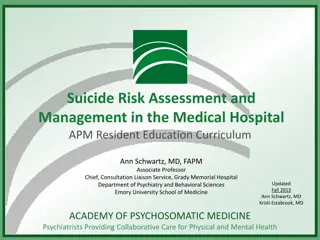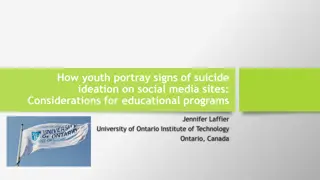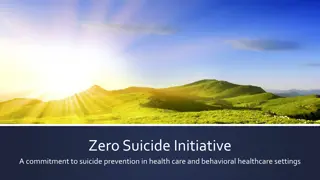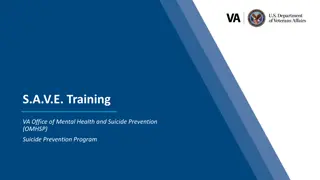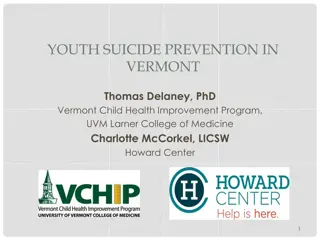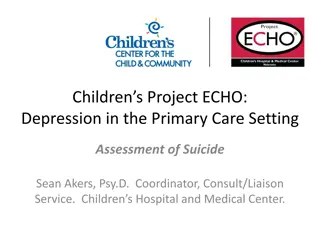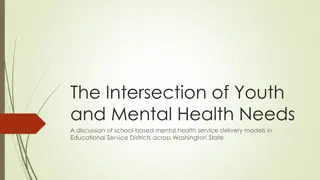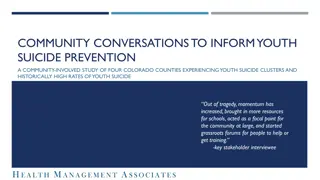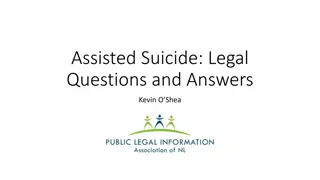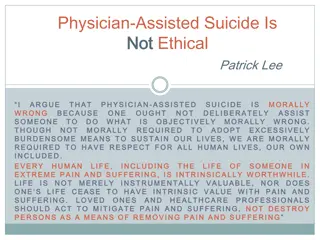Physician-Assisted Suicide: Multiple Considerations and Perspectives
This presentation delves into the complex topic of Physician-Assisted Suicide (PAS), exploring various aspects such as patient autonomy, quality of life, medical ethics, legal considerations, and religious/cultural perspectives. It discusses the importance of safeguarding vulnerable populations, the impact on physician practice, psychological effects, alternatives to PAS, and the public/political implications. The content highlights the definition of PAS according to AAHPM and aims to foster open discourse and education on this sensitive and controversial issue.
Download Presentation

Please find below an Image/Link to download the presentation.
The content on the website is provided AS IS for your information and personal use only. It may not be sold, licensed, or shared on other websites without obtaining consent from the author. Download presentation by click this link. If you encounter any issues during the download, it is possible that the publisher has removed the file from their server.
E N D
Presentation Transcript
Physician-Assisted Suicide Abhilash Padi, MS MD Hospice and Palliative Medicine PGY-4 University of South Florida June 12th, 2024
Objective No assertions on personal or professional position Destigmatize possible perception of sensitivity/controversy Encourage open discourse Educate on history and evolution Explore the gray Highlight potential role of PAS in mental anguish/suffering Professor Richard Feynman: I would rather have questions that can t be answered than answers that can t be questioned.
Multiple Aspects To Consider Patient Autonomy Individuals have the right to make decisions about their own lives if they are of sound mind Quality of Life Advocates argue can help end patient lives with dignity/avoid prolong suffering, thus a compassionate option Medical Ethics Some argue PAS is a violation of do no harm. Argument for palliative care - not actively assisting in death Legal Considerations Illegal in most jurisdictions. Calls into question role of state in regulating end-of-life decisions. Potentially counters autonomy Religious/Cultural Perspectives Moral opposition with view that only a higher power has the right to determine timing of death
Multiple Aspects To Consider Vulnerable Population/Safeguards Concerns for potential abuse, cost- savings in end-of-life. How to ensure decision to pursue is truly voluntary Impact on Physician Practice Possibly contradicting forces for physician to conscientiously object to PAS, while still respecting patient wishes Psychological Impact Emotional (ongoing) toll of PAS decisions, even once made, and need for support for all involved parties Alternatives to PAS Critics of PAS argue hospice/palliative care are superior than active hastening of death Public/Political Impact Public opinion varies and questions arise as to political advocacy/influence of special interests in shaping public policy
AAHPM Definition Physician-Assisted Suicide (PAS) is defined as a physician providing, at the patient s request, a prescription for a lethal dose of medication that the patient can self-administer by ingestion, with the explicit intention of ending life. https://aahpm.org/positions/padbrief
Historical Perspective: The Netherlands First country to decriminalize euthanasia Law passed in April 2001, enforced April 2002: Termination of Life on Request and Assisted Suicide Act Officially tolerated in practice since 1985 Doctor will not be prosecuted for terminating a person s life if convinced request is voluntary, well-considered, and has unremitting suffering At least one other physician must have reached same conclusion of terminal illness Surveys suggested 90% public support Dutch director of Euthanasia Society: The best possible care should be given before the issue of euthanasia arises. However, a discussion of euthanasia should be part of the palliative care package https://www.ncbi.nlm.nih.gov/pmc/articles/PMC2566446/pdf/11436481.pdf
The Netherlands Number of euthanasia cases 2000-2022 8720 reported cases highest in recorded period 2000 vs 2022 Deaths: 140k vs 170k 2000 vs 2022 Percentage of Deaths PAS: 1.5% vs 5.1% https://www.statista.com/statistics/1363041/netherlands- euthanasia/
The Netherlands: PAS in Mental Health Euthanasia for mental distress/disorders Spanish media outlet El Pais reporting 2023: 138 PAS for psychiatric conditions, 20% increase from previous year First case of euthanasia of a minor (16-18 yo) who did not require parental consent by law parents were informed and supportive Report posted on Regional Commissions (RTE) oversees all euthanasia cases Experts reviewed request and verified it was sound, voluntary, met criteria for severity and lack of alternative solutions Psychiatrists must balance suicide prevention with requests for euthanasia https://english.elpais.com/international/2024-04-19/debate-ignites-in-the- netherlands-over-rise-in-euthanasia-for-mental-disorders.html
Mental Health Concerns in Gen Z American Psychological Association (APA): Gen Z individuals more likely to report mental health concerns, such as depression/anxiety, than previous generations 2022 survey of 1055 Gen Z adults: 56% report depression, 42% had a diagnosed mental health condition More than a quarter of those diagnoses received diagnosis during pandemic or later Gen Z is LESS likely to seek mental healthcare than Millennials: 28% vs 40% sought help in the last year Will PAS be more commonly utilized for mental anguish/suffering?
The Netherlands: PAS in Mental Health Zoraya ter Beek physically healthy 29 yo female Officials gave final approval to die by PAS on the grounds of unbearable mental suffering First applied for PAS in 2020 Must be evaluated by team of physicians, have a second opinion on eligibility, then the whole case has to be reviewed by a third independent doctor People think that when you re mentally ill, you can t think straight, which is insulting In the three and a half years this has taken, I ve never hesitated about my decision... Update 6/1/24: Did die the previous week by PAS https://nypost.com/2024/05/17/world-news/dutch-woman-zoraya-ter- beek-granted-euthanasia-final-approval-over-her-severe-depression/
Current Jurisdictions Worldwide Belgium Canada United States Spain The Netherlands Switzerland Luxembourg Australia New Zealand Germany* Austria* Italy* Columbia* *Still legislating; legal protections for physicians; developing law
United States 11 Jurisdictions New Jersey California New Mexico Colorado Oregon District of Columbia Hawaii Vermont Washington Maine Montana* - State Supreme Court ruled that assisted suicide did NOT violate Montana legal precedent or state statutes, even though no Montana laws specifically allow
United States Law: distinguishes legal act of medical aid in dying from the act of helping someone die by suicide, which is prohibited Source: "D.C. physician-assisted suicide law goes into effect". The Washington Times.
Oregon First State Measure 16 of 1994 Death with Dignity Act DWDA allows terminally ill patients who meet specific qualifications to end their lives through voluntary self-administration of a lethal dose of medications prescribed by a physician for that purpose. Law requires Oregon Health Authority to collect information about the patients and physicians who participate in the Act and to publish an annual statistical report. 2023: 560 received prescriptions, 367 died from prescriptions, including 30 who received prescriptions in previous years
Oregon First State Specific patient requirements to participate: 18 years or older Capable of making and communicating health care decisions to practitioners Diagnosed with a terminal illness that will lead to death within six months Attending and consulting physicians must determine whether patient meets criteria and report to OHA 2023: Oregon residency requirement stricken from Act information on patient s state of residence is not collected during DWDA process Has this change opened the state to the potential for medical tourism for the purpose of dying? Vermont passed same provision in May 2023 https://www.oregon.gov/oha/PH/PROVIDERPARTNERRESOURCES/EVALUATIONRESEARCH/DEATHWIT HDIGNITYACT/Documents/year26.pdf
Overview of Safeguards and Protocols PAS laws vary by jurisdiction, but most share core safeguards Eligibility Requirements: Terminal diagnosis with limited prognosis (less than 6 months) Mentally competent to understand decision and its implications Typically limited to adults >18 Informed Consent: Multiple requests with waiting period in between Often requires second opinion for both diagnosis and decision-making capacity Physician must full disclose all treatment options, including palliative/hospice care Usually require witnessing by two independent parties Patients retain the right to withdraw from the process at any point Patient and Physician Privacy: Laws typically protect identities of participating patients/physicians
Potential Subjectivity of Safeguards Prognosis notoriously difficult to accurately assess Landmark article (1999) in Palliative care showed physicians are only about 20% accurate in prognosis, with most errors over-optimistic in timeline May affect patient decision-making as may pursue more aggressive care, or may pursue options such at PAS to limit suffering Competence consensus for competence generally exists but brings into question PAS for mental anguish/suffering/depression Adults/Age >18 May question when, or under what conditions, a minor achieves autonomy, especially if they can demonstrate accepted mental competency/consciousness/self-awareness
AAHPM Advisory Brief: Guidance on Responding to Requests for PAS Determine the nature of the request Immediate assistance or future? Thoughts with/without a plan or intent? Frustrated or serious thoughts? Clarify cause of intractable suffering Loss of functional autonomy? Perception burden on others? Severe pain/sx? Emotional/spiritual distress? Evaluate decision-making capacity Pt seem rationale and proportionate to clinical situation? Request consistent with long-standing values? Explore emotional factors Feelings of depression, worthlessness, guilt, fear interfere with judgement? Patient have untreated depression? Explore situational factors Poor social network? Coercive influences? Subject to emotional, financial, or other forms of exploitation/abuse? https://aahpm.org/positions/padbrief
AAHPM Statement on Physician-Assisted Dying AAHPM takes a position of studied neutrality on whether PAS should be legally permitted or prohibited Has concerns about a shift to include PAS in routine medical practice, including Palliative Medicine Risk of unintended long-range consequences, including effects of the relationship and integrity between medicine and society and patient/physician Recommend augmentation of patient psychosocial and spiritual resources to better manage suffering, making PAS requests more rare Where legally permitted, physicians should not be obligated if they hold moral/professional objections https://aahpm.org/positions/pad
Physicians Beliefs about PAS: A National Study 2019 Yale Study survey sent to 1000 randomly chosen physicians in US 60% thought PAS should be legal 13% answered yes when asked if they would perform the practice, if legal 49% agreed that most patients who seek PAS do so because of pain 58% agreed that the current safeguards in place are generally adequate 30% thought legalization would lead to legalization of euthanasia 60% disagreed with the statement that non-psychiatrist physicians are adequately trained to screen for depression 60% disagreed with the idea that physicians can prognosticate with a 6-month or less certainty 46% agreed that insurance companies would preferentially cover PAS over possible life-saving treatments if PAS legalized nationally https://www.ncbi.nlm.nih.gov/pmc/articles/PMC6913834/
Patient Attitudes Towards PAS May 2020 Gallup poll random sample of 1028 adults > 18 yo, from all 50 states and District of Columbia 74% of US adults support PAS at their request, by painless means White: 77% Non-white: 65% Democrat/Leaning Independents: 85% Liberal: 87% Moderate: 80% Conservative: 57%
Patient Attitudes: Why Pursue Retrospective chart survey in British Columbia in 2016 250 assessments 112 patients had PAS Disease-related sx (60%) Loss of autonomy (53%) Study showed similar to other jurisdictions, but different proportions APA recent update neither endorses nor opposes PAS Two decades of evidence from Oregon desire to hasten death comes from wanting to maintain some power over one s own life really wanted to have control over the circumstances of dying. Concern for loss of autonomy and function, or worries about future pain https://www.apa.org/monitor/2017/12/ce-corner https://www.ncbi.nlm.nih.gov/pmc/articles/PMC6135145/
National Hospice and Palliative Care Organization Position Supportsindividuals rights to exercise autonomy as is legal in their communities and seeks to provide assistance where medical aid in dying is an option NHPCO opposes MAID as a societal option to alleviate suffering Palliative care intends to neither hasten nor postpone death Is it rational to support an individual s right to exercise autonomy for a specific act (PAS), while opposing said act itself? https://www.nhpco.org/wp- content/uploads/Medical_Aid_Dying_Position_Statement_J uly-2021.pdf
Inpatient Hospice Medically Hastened Death? 2007 article assessing causes of death in an inpatient hospice program Pneumonia present in 79% of all patients Appeared to be major cause of death in 44% of patients Other deaths: cancer direct effects, heart disease, hepatic/renal failure, PE, hypercalcemia Opioids and other common-used inpatient hospice medications may cause respiratory suppression in patients with potentially already weak respiratory drive Risk of above weighted against benefit of addressing dyspnea/suffering https://pubmed.ncbi.nlm.nih.gov/17803410/
Future of PAS Many Topics Ethics and morality Existentialism of suffering Eligibility Implementation Political Financial implications (however unsavory) Will PAS become more widely utilized in end-of-life care?
Future Considerations: Political New Jersey (Blue) California (Blue) New Mexico (Blue) Colorado (Blue) Oregon (Blue) District of Columbia (Blue) Vermont (Blue) Hawaii (Blue) Washington (Blue) Maine (Blue) Montana* (Red)
Future Considerations: Political Religious Affiliation Pew Research Center Party affiliation: 37% lean Republican, 44% Democrat Importance of religion very : 61% Republican, 47% Democrat Does religion influence political affiliation? 2019 Pew study suggests Americans agree upon separation of church and state No clear answer as to whether this can be definitely answered
Future considerations: Religion Axiom: (IF) we acknowledge religion as a potential barrier to widely accepted PAS Pew-Templeton Global Religious Futures project surveys in more than 95 countries asking 200,000 people about their religious identities, beliefs, and practices The percentage of American adults who identify as Christian has been declining each year, while the share who do not identify with any religion has been rising rapidly. Does declining participation in religious activities affect acceptance/normalization of PAS?
Future Considerations: Financial AMA: Health spending increased in the U.S by 4.1% in 2022, to $4.4 trillion Health expenditures per person: $12555 in 2022, over $4000 more than any other high-income nation 1998: Typical uninsured patient dying one month earlier by PAS might save his/her family $10000, having already spent as much as $2000 that year. https://www.nejm.org/doi/full/10.1056/NEJM199807163390306 https://www.healthsystemtracker.org/chart- collection/health-spending-u-s-compare-countries/
Future Considerations: Standard of Care /Commonly Accepted Practice If more accepted by the public, will this lead to expectation of PAS as a mandatory option in end-of-life care? Onus on physician to potentially forego option, based on personal moral/ethical conflict further added physician burden? Would there be a duty to provide PAS, if this were to become common practice, especially in Palliative care? Would limiting wide PAS utilization to certain diseases/conditions be another way to safeguard? Should timeline of prognosis be a rigid requirement, given limits of prognostication?
Discussion Questions? Comments? Thoughts? Thank you.


